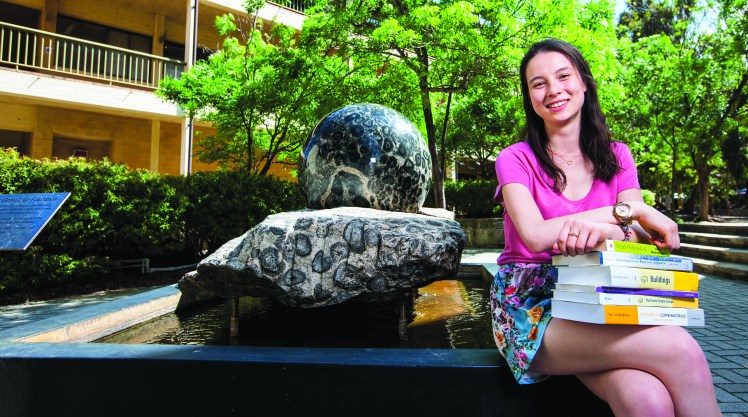
“I am a strong believer that if you work very hard, success will follow”
I have just finished my Master of Philosophy in Pure Mathematics at the University of Western Australia, and am about to start my PhD at Imperial College London. My masters research was concerned with certain subsets of points and lines in finite geometries. Finite geometries are structures where we have lines with a finite number of points on them, planes with a finite number of lines and so on. There are so many connections in mathematics that finding new interesting sets of lines in finite geometries can also give us new objects in algebraic combinatorics for free!
Apart from my studies, I enjoy participating in outreach activities such as the National Mathematics Summer School, Curious Minds, and Teach Learn Grow as well as various school visits and open days based at UWA. I am also the founder and immediate past president of the UWA Mathematics Union, which brings together mathematics students at UWA and provides educational advocacy. I also sit on my faculty’s Equity and Diversity Committee. My hobbies include reading, knitting and crocheting, doing crossword puzzles and travelling. One of the best things about being a mathematician (and training to become one!) is that mathematics is such an international community. I’ve been lucky enough to travel to several conferences to share my research and meet people from all around the world.
How have your academic interests changed during your time at university?
I started out studying a double degree in chemical engineering and chemistry. I soon decided chemistry wasn’t for me and decided to change to a pure maths major. From the moment I took my first pure mathematics class in second year, I knew that it was my passion. I deferred my engineering degree to do Honours in mathematics, and later dropped out of engineering altogether to pursue mathematics full time.
What has been the highlight of your studies so far?
One of the biggest highlights of my studies has been the opportunity to travel to conferences both in Australia and overseas. One conference which I felt extremely privileged to attend was the 3rd Heidelberg Laureate Forum which brought together 200 young researchers from around the world to meet laureates of the biggest prizes in mathematics and computer science.
What achievement are you most proud of in your studies?
The achievement that I am most proud of in my studies is becoming involved with initiatives and programs to foster mathematics and other STEMM disciplines at all levels of education. One of the coolest programs in this vein is the Curious Minds camp, which provides talented high school girls, many from disadvantaged backgrounds, the opportunity to receive development and mentoring from women in STEMM from both academia and industry.
How does society benefit from more women in STEMM and positions of leadership?
More women in STEMM will give rise to a more inclusive STEMM culture. This means that future generations of women in these disciplines aren’t subjected to the ‘boys club’ culture that often exists in male-dominated industries. In addition, more women in positions of leadership in STEMM dispels the misconceptions about STEMM disciplines being for boys, and paves the way for more girls choosing STEMM in high school, university and beyond.
What advice have you been given that best helped you grow as a scientist?
I don’t quite remember who gave me this advice, but the saying “Nothing worth doing is easy” comes to mind. I am a strong believer that if you work very hard, success will follow. In addition, when you work hard, you often find that lots of people around you value your work ethic and want to help you get to where you want to go.
[Image attribution: University of Western Australia]